

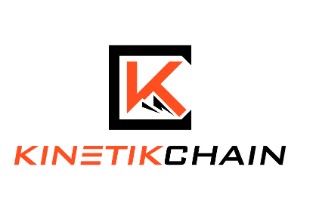
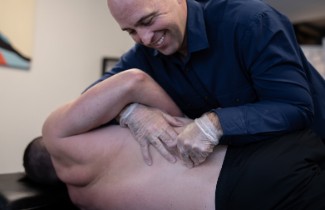
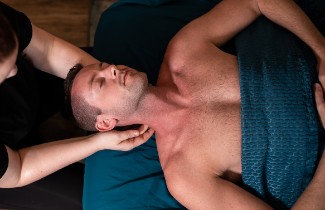
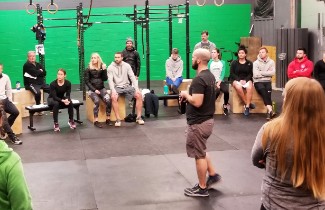
Looking for Physical Therapy in Denver, CO?
At KinetikChain Physical Therapy, we help people in Denver quickly recover from pain or injury so they can stay active in their favorite sport/hobby, continue exercising, and get back to what they love to do.
Have you found our site because you’re looking to work with a physical therapist in Denver? Have you or someone you know been recommended to try physical therapy?
If yes, then you’ve come to the right place!
When pain and problems like back pain, sciatica pain, neck pain, shoulder pain, running injuries, skiing injuries, hiking injuries and plantar fasciitis appear, it’s tempting to think “it’ll go away if I just rest” or even pretend like it never happened…
Unfortunately, oftentimes the problem festers, slowly getting worse, and begins impacting your lifestyle and ultimately disrupting your happiness.
Things like pain medications, injections, or other services like chiropractic, massage, or acupuncture may provide temporary relief… but then the symptoms return and you feel even more helpless.
Physical therapy, when done properly, not only gets rid of your pain, but also finds the root cause of the pain so your pain STAYS AWAY and so you can get back to your normal lifestyle.
We know you’re skeptical. Likely you’ve been to other healthcare practitioners in the past and nothing they’ve done has helped you or your problems.
We Understand.
If that sounds like you, you’re not alone. Most of our clients at KinetikChain Physical Therapy have often:
Fascial Stretch Therapy (FST) is a unique method of assisted stretching that focuses on the joint capsule, fascia, and stretching not only muscles but whole body regions. By focusing on more than just the muscles we are able to help you achieve optimal flexibility, sports performance, strength, rela...
VIEW MOREGet rid of those knots and that muscle soreness/stiffness right away with our fast working trigger point dry needling. Availability this week if not today.
Fascial Stretch Therapy (FST) is a unique method of assisted stretching that focuses on the joint capsule, fascia, and stretching not only muscles but whole body regions. By focusing on more than just the muscles we are able to help you achieve optimal flexibility, sports performance, strength, rela...
VIEW MOREDiscover How To Finally End Long-Term Nagging Injuries, Release Tension In Tight Muscles, Reduce Unwanted Stiffness, & Get Rid of Recurring Soreness, Naturally Without Any Nasty Side Effects
Don’t sacrifice the workouts and activities you love over problems that can be easily resolved...
Sports Physical Therapy Denver
Are you an athlete or active adult that wants to get back to your favorite sports and workouts without worrying about your body holding you back?
Do you dread going to the doctor because all they tell you to do is rest and take time off fr...
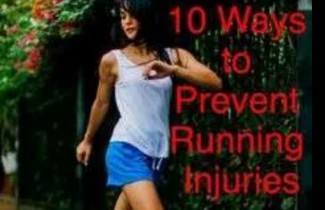
10 Ways to Prevent Running Injuries We know that for many of our pa...Read More
10 Ways to Prevent Running Injuries
We know that for many of our patients running is a passion. The truth is, however, so many of those same patients visit us because of injuries related to their runs. Far from telling them to stop running, our main goal is to prevent debilitating knee/foot/ankle injuries BEFORE they happen, and to keep our patients as active as possible.
Whether you’re an athlete, a casual runner, a mom squeezing a jog in before work, or even just a bi-weekly trail blazer, injuries related to running can happen to you. And the sad thing is, knee, ankle, and foot injuries can often set your training and activity back considerably. We don’t want this happening to you, and that’s why this post looks at the 10 best ways to PREVENT running injuries, thus keeping you on your feet for longer.
1. Leg Strengthening Exercises – Strengthening your leg muscles is key to preventing an injury on your run. Leg muscles ensure that we have the support and strength to stave of the consequences of a fall or a twist. Why not try strengthening your leg muscles on a daily basis? Forward lunges are great way to start, as they target hip, hamstring, quad, and glute muscles.
2. Hydration, Hydration, Hydration! – Drinking enough water is absolutely VITAL in maintaining a pain free, active lifestyle. Runners are particularly in need of proper hydration: when you run, the joints in your legs and back have to deal with an enormous amount of pressure. If these joints aren’t lubricated properly, friction will cause abrasion, thereby leading to pain and discomfort. Make sure you drink at least 8 cups of water on a daily basis, and if you’re running long distances in the heat make sure you add to that number.
3. Flexibility is Key – As with any exercise, being flexible greatly reduces your risk of injury. When it comes to running, things are no different. Flexibility is particularly important for runners, as it means the muscles are well equipped to deal with varying terrain, obstacles, and exertion. Why not try doing yoga or Pilates? These types of exercises strengthen your core and leg muscles, thereby correcting your posture and gait during your run. It is far more difficult to injure a flexible muscle, and should a muscle be injured, a flexible muscle is able to recover much faster.
4. Gradual Mileage Increase – We all want to shoot out the gate at a hundred miles an hour, but in order to prevent injury, the best thing to do is to increase the mileage steadily. Working towards a goal is often an effective way of preventing injury; it gives your body a chance to strengthen and catch up to what is being asked of it. If you start slow and steady, you’ll win the race!
5. Warm Ups and Cool Downs – This is a tip that is overlooked far too often. Lactic acid build-up causes our muscles to get stiff, thus increasing the risk of injury. As little as a 5 minute warm up can heat up the muscles making them more flexible and ready for a workout and as little as a 5 minute cool down can help you recover from the workout to get you ready for the next one. This gives you the best possible chance of beating the odds. What do you have to lose? Why not do some stretches, a gentle walk, or even a little yoga before/after your run?
6. Rest Days – We know that you hate hearing this, but resting your legs and knees is an essential part of training and/or participating in any type of fitness regime. If you don’t allow your muscles to rest and recharge, fatigue might expose you to serious injuries which could set you back for a lot longer. Take a day or two off during the week and opt for a different type of activity: Pilates, yoga, or even swimming will do the trick.
7. Essential Footwear – Invest is some supportive, comfortable running shoes. If your soles are worn out and you’re no longer getting the support you need, it’s time to grab a new pair. Remember to introduce the new footwear gradually, thereby giving your body time to adjust. All shoes are different, and it’s important to find a pair that’s right for you.
8. Running Form – Runners need to be aware of their running form. In so far as balance and posture are concerned, running is particularly responsible for twist/fall injuries. Your running form needs to be as functional and safe as possible, and one way to correct muscle overcompensation, or weight distribution imbalances, is to practice rectifying activities such as Pilates or yoga. Your legs, knees, ankles, and feet will definitely thank you!
9. Reduce Downhill Running Impact – Running downhill is particularly hard on your knees, and while many of you might like the challenge, it is a good idea to reduce the amount of downhill running you’re doing. Because running already places far more pressure on your joints than walking, taking care of your knees is a big priority.
10. Vary Running Terrains and Surfaces – The type of terrain you choose to run on plays a big role in the way your joints react and function. All too often, running injuries are as a result of unforgiving, hard terrain such as asphalt and/or cement. Exposure to these types of terrain over long distances can result in serious injuries which could put your running lifestyle on hold. Try varying your terrain by running on grass and sand, for example.
So, there you have it: 10 ways to prevent debilitating injuries as a result of running. That having been said, if you are currently experiencing pain in your legs, knees, or feet, we invite you chat to one of our friendly, professional physical therapists at KinetikChain Denver Physical Therapy, today. Not only will a PT find the root cause of the problem, but he/she will end the pain and help you maintain a pain free, active lifestyle moving forward. Don’t wait for the pain to disappear – act now and be back on the road in no time. We know how important running is to you, and we’re here to help.
If you just want more information on how to minimize injuries when you run you can get more information by reading either our page and ebook on running injuries here or on our blog on our website (www.kinetikchaindenver.com)
If you are having pain and want to start getting back to running the way you want, need, and deserve today you can start by going here and scheduling a free 20 min phone call with a specialist running physical therapist to see if we would be a good fit to help you.

0

0

0
you must login
Looking for Physical Therapy in Denver, CO?
At KinetikChain Physical Therapy, we help people in Denver quickly recover from pain or injury so they can stay active in their favorite sport/hobby, continue exercising, and get back to what they love to do.
Have you found our site because you’re looking to work with a physical therapist in Denver? Have you or someone you know been recommended to try physical therapy?
If yes, then you’ve come to the right place!
When pain and problems like back pain, sciatica pain, neck pain, shoulder pain, running injuries, skiing injuries, hiking injuries and plantar fasciitis appear, it’s tempting to think “it’ll go away if I just rest” or even pretend like it never happened…
Unfortunately, oftentimes the problem festers, slowly getting worse, and begins impacting your lifestyle and ultimately disrupting your happiness.
Things like pain medications, injections, or other services like chiropractic, massage, or acupuncture may provide temporary relief… but then the symptoms return and you feel even more helpless.
Physical therapy, when done properly, not only gets rid of your pain, but also finds the root cause of the pain so your pain STAYS AWAY and so you can get back to your normal lifestyle.
We know you’re skeptical. Likely you’ve been to other healthcare practitioners in the past and nothing they’ve done has helped you or your problems.
We Understand.
If that sounds like you, you’re not alone. Most of our clients at KinetikChain Physical Therapy have often:
Training Block was created with a mission to support and empower runners, in order to elevate our sport. We do so by giving runners access to a network of local sport performance providers, who provide runners with the care they need from coaching, physical therapy, massage, strength training, and more. We also give providers an easy way to connect with each other and share articles, videos, and other resources that benefit runners and providers alike. For every service booked through Training Block, we donate 10% of our revenues to Training Block’s Elite Athlete Fund, which sponsors elite runners who do not have professional contracts and need financial support for racing at their highest level.
Copyright © 2024 Training Block. All rights reserved.
Refer a friend and get $5 discount on order!